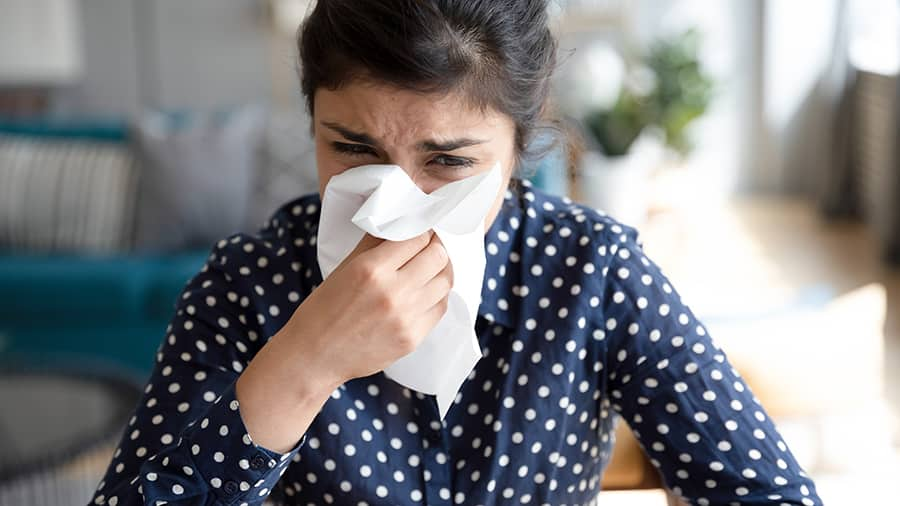It starts with a tickle in your throat. By the next day, you've got a stuffy nose, body aches and it feels like you've swallowed sandpaper. While loading up on cough medicine and nasal decongestants may be your first instinct when you've come down with a cold, teeth and how your illness affects your overall oral health should also be a priority.
According to the Centers for Disease Control and Prevention, adults get two to three colds per year on average, each lasting between seven and 10 days. It's important to know how to care for yourself properly so you can ease symptoms and avoid cold complications. If you want to feel better fast, you should take steps to safeguard your mouth. So what are the concerns regarding a cold, teeth and your oral health?
Nasal Congestion and Dry Mouth
You know the feeling: You lay your achy head down to sleep only to realise your nasal congestion is preventing you from breathing through your nose. Instead, you have to breathe through your mouth, but it gets so dry and parched that you wake up constantly for a drink of water. Nasal congestion is a major cause of dry mouth and subsequent reduced saliva flow. In addition, certain medications you may be taking, such as decongestants and antihistamines, can reduce saliva flow, according to the Mayo Clinic. Alleviating dry mouth is important because excess dryness promotes the growth of bacteria, increasing your chances of developing tooth decay and gum disease. Plus, it makes it harder to chew, swallow and get your nutrients, which you need in order to heal.
To combat dry mouth during a cold, continue taking your nasal decongestants. They will help dry mouth in the long run, since you'll soon be able to breathe through your nose. Have a water bottle nearby and take frequent sips of water or juice to keep your mouth lubricated and suck on cough drops to stimulate saliva flow. According to the Indian Dental Association using a humidifier can add much needed humidity to the air and prevent you from waking up with dry mouth. You will find vaporisers in most of the pharmacies or variety stores.
According to the National Health Portal of India, irrigating the sinuses with a salt water solution is often recommended for sinusitis and allergies, in order to clear the nasal passages of mucus. Another solution for nasal washing washing utilises powdered Hydrastis Canadensis. And even though you may not feel up to it, keeping up with your regular brushing and flossing schedule while you fight a cold is important for your oral health, as is using peroxide-free and alcohol-free mouthwashes which prevent dry mouth.
Sinus Pain and Toothaches
The last thing you need when you're sick is a toothache. While you might think the two are unrelated and you're just having a stroke of bad luck, pain in your upper teeth and tenderness around your sinuses may actually be signs of sinusitis, either caused by your cold virus or a bacterial infection. The upper rear teeth are close to the sinuses, and pain in that area is a common symptom of sinus conditions, according to the Mayo Clinic. The tell-tale sign is when pain isn't limited to one tooth.
If you've had a recent cold and suddenly feel pain in your upper teeth, you may be suffering from acute sinusitis. According to the National Health Portal of India, symptoms of chronic sinusitis includes - Passage of a thick , yellowish or greenish discharge from the nose or down the back of throat (called post nasal drip or discharge). Nasal obstruction, blocked nose, obstructed sensation in the nose causing difficulty of breathing through the nose. Pain, tenderness and swelling around your eyes, cheeks, nose or forehead. Reduced sense of smell and taste. Acute sinusitis may resolve on its own, but if you're experiencing these symptoms and they haven't improved with over-the-counter medicines, your best bet is to see your doctor, who may prescribe antibiotics.If you take these steps as soon as you start feeling cold symptoms coming on, you protect your teeth, mouth and overall oral health, and you'll recover faster from the common cold — teeth included. Don't forget fluids, extra rest and some chicken soup!






